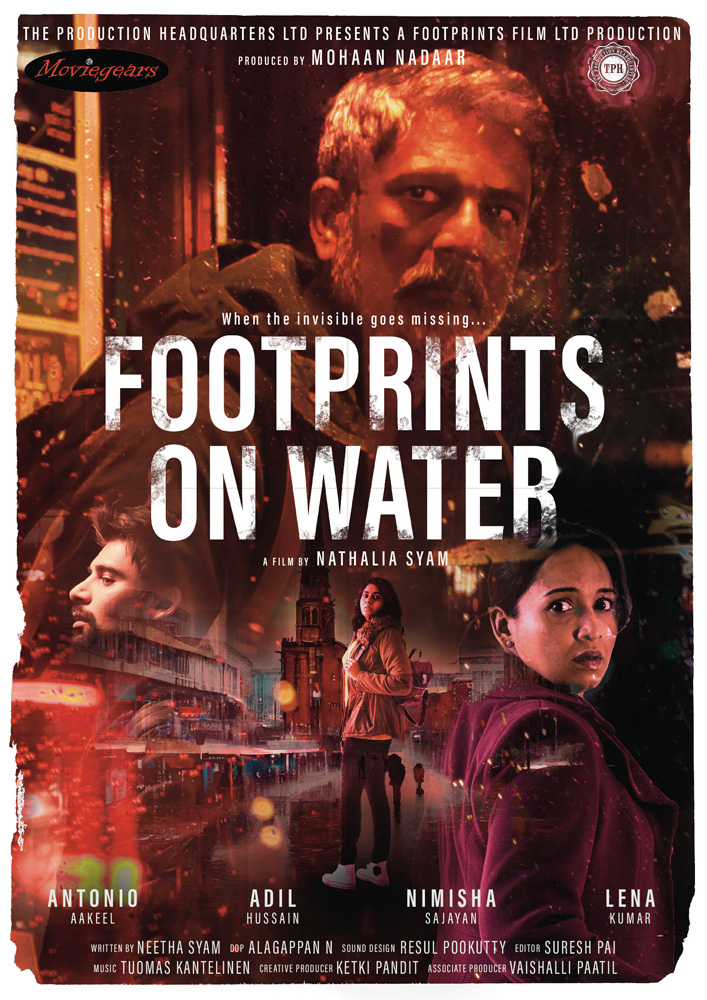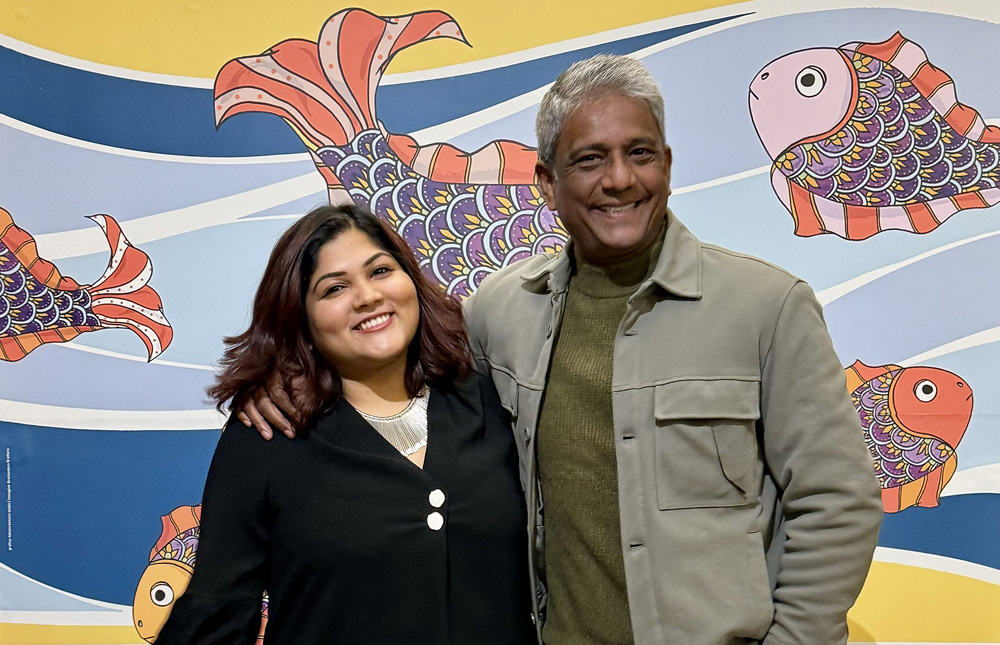First feature film, and award-winning, by the Indian director Nathalia Syam
by Laura Sestini
Director Nathalia Syam and actor Adil Hussain were among the guests present to the 23rd edition of River to River Florence Indian Film Festival, the only event in Italy that explores the face of contemporary India through cinema.
At the end of the screening, in front of the audience, they responded with courtesy, simplicity of manner and involvement to the numerous questions, which showed equal interest on the part of the spectators.
The film deals with a very current topic, both in Europe, in Great Britain where it was filmed, and in the majority of countries in the world: illegal, undocumented migration.
A dramatically realistic film, which reports a mix of painful situations in which foreigners can easily be involved, especially those traveling illegally, which the director herself and her family experienced in the UK, as immigrants when she was still a teenager.
This film, released in June 2023, is Nathalia Syam’s first feature film, a work which in its short run has already obtained public approval and also numerous awards at international Indian film festivals. A very interesting plot, not at all obvious, accompanied by excellent scenes and photography and the skill of the actors for performances that are neither pushed nor dull, which never lose their dramatically sustained tone, very credible. Extremely realistic.
Nathalia Syam also answers our questions.
You look very young, is “Footprints on water” your debut work? A multi-award winning work…
Nathalia Syam – Footprints On Water is my debut film, but before that, I made a couple of short films. It took me a while to become a Film Director, and I did various jobs in the film industry, like being a runner, assistant director, and even driving on set. These experiences helped me understand how a film set works. Directing short films was important because it let me try things out, learn, and get better at storytelling on a smaller scale. One of my short films, “Lehenga”, got attention at many festivals and won a few awards. It was like a crucial training period that prepared me to handle challenges and improve my storytelling skills.
Adil Hussain, well-known and multi-awarded, appears as the main actor in your film. A courageous or lucky choice?
N.S. – I’ve been a big fan of Adil Hussain for a while, so when I found out he was filming in the UK, I had to seize the chance. I got in touch with my producer, Mohaan Naadar at TPHQ, and he arranged a meeting for us to pitch our idea to Adil. Luckily, the meeting went well, and after Adil read the script, he agreed to come on board! Working with Adil has been amazing; he’s not only a fantastic actor but also a wonderful person. His keen attention to detail and strong work ethic made the whole process much smoother.
What led you to decide to pursue a career in cinema?
N.S. – My passion for filmmaking started back in school when I got involved in acting through school plays. Bringing characters to life on stage fascinated me. In my late teens, I was lucky to be part of a short film, giving me a peek behind the scenes. That experience made me realize the artistry and collaboration involved in filmmaking.
Even though I initially pursued accountancy after school, my heart was always in filmmaking. The power of telling impactful stories and evoking emotions through film resonated with me deeply. So, I left my accounting studies and started working in the film industry, starting as a runner and eventually pursuing a film degree in London.

I saw how films could influence society, shape perspectives, and bring people together. This realization, combined with my love for visual storytelling, led me to choose the path of a filmmaker. I’m motivated by the desire to contribute my creativity to this art form, aiming to create films that inspire, entertain, and leave a lasting impression on audiences.
In your youth you had a family experience of emigration from India to Great Britain: does the film have any relevance to your life?
N.S. – The inspiration for addressing the migration crisis in “Footprints on Water” comes from our own experiences as immigrants of Indian origin who moved to the UK when we were young. The writer of the film, Neetha Syam, is my sister and for us, living in one of the most Asian-populated areas of London, we found ourselves captivated by the lives of the migrant community around us. This fascination led us to a crucial question: what would happen if an undocumented migrant suddenly disappeared? How would they navigate such a situation while staying invisible to society? These musings became the foundation for the film’s storyline.
Although “Footprints on Water” isn’t based on a specific real story, it draws from various experiences and stories we encountered within the migrant community. Our goal is to shine a light on the struggles, fears, and challenges faced by undocumented migrants – an issue often kept hidden from the public eye. We hope to bring attention to this important topic through the lens of our collective experiences and the narratives we’ve encountered.
The film shows that the life of the migrant is very hard. Can this also be stated in reality, or when you are a teenage migrant, does life always have a positive outlook?
N.S. – Migration is not always easy, especially for a teenager. Moving to a completely new environment and country, leaving behind all past friendships and familiarities, is extremely challenging, speaking from personal experience. Additionally, as a teenager, it is very difficult to assimilate the sudden and drastic changes to lifestyle and priorities that come with migrating to a new country. Despite all the hardships, I found it helpful to connect with kids from both similar and different backgrounds who were going through various situations like myself. Forming these bonds during challenging times has been invaluable, and I cherish the friendships that were forged in the face of adversity. This experience also provides a unique perspective on life. I couldn’t imagine making this movie if it weren’t for my parents deciding to migrate to the UK. So, all in all, like many other things in life, it is really a mixed bag of both good and bad.
In the film it was decided to narrate a specific criminal action, organ trafficking. Something that is never mentioned in migration stories. Why exactly this fact?
N.S. – Having grown up in a migrant-centric community, we initially believed we were familiar with most of the harsh and uncomfortable realities associated with it. However, we dedicated a significant amount of time to research, aiming to deepen our understanding for the development of our script. One of the most shocking revelations during our research involved cases of organ trafficking. Upon hearing these stories, it became evident that this is a risk often overlooked in discussions about undocumented migration.
Our goal in creating this film was to educate the audience and prompt them to make informed decisions, fully aware of the associated risks. Organ trafficking is a topic we chose because we consider it one of the most severe consequences of undocumented migration, yet it is not commonly associated with such situations. We believe shedding light on this issue is crucial for raising awareness and fostering a better-informed perspective among viewers.
Do you believe that your cinematic future will be directed towards the social sphere, or “Footprints on water” is just a fortuitous case?
N.S. – I believe it was crucial for me to begin with a topic that held personal significance, motivating me to see it through. In the future, while I may explore diverse subjects, my motivation lies in creating films of social importance too. I see cinema as a powerful medium to both entertain and educate. Additionally, I am drawn to the concept of crafting films that leave audiences with meaningful thoughts that they can take away with them.
——————————
Footprints on Water by Nathalia Syam, o.v. sub. Italian, English, UK, 2023, 106′
————————————-
Saturday, December 16th 2023 – n°50/2023
On the cover: Nathalia Syam and Adil Hussain – Photo courtesy River to River Florence Indian Film Festival




